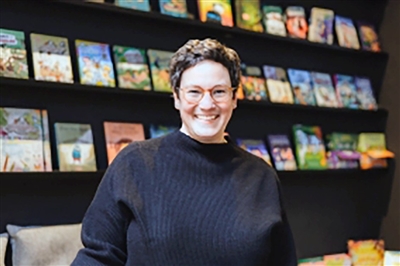■Daniela Steiner (Rights Director, Carlsen Verlag GmbH) □Zhao Yixue
Carlsen was founded by Danish publisher Per Carlsen in 1953, as a German subsidiary to Forlaget Carlsen in Denmark. Then, Per Carlsen introduced the successful brands “Petzi” and “Pixi” into the German market. Especially Pixi, the small softcover picture books, which has achieved tremendous success to this day.
As German market leader in children’s books, Carlsen excels in picture books, docu-fiction like Lesemaus series for the younger ones, Pixi™ mini books, fiction for children and young adults, and the Conni series which gives guidance to kids from age 3 to 12. Recently, we interviewed Daniela Steiner, the rights director of Carlsen Verlag GmbH to talk about publishing cooperation between Germany and China.
□In recent years, how has Carlsen cooperated with China Publishing Houses?
■Since 2018, our company has worked more closely with Chinese publishers than ever before. We were especially happy to have our Pixi™ books (A popular series of children’s books founded in 1954. In 1982, Pixi himself took shape. The character—a little elf with a pointed cap, green doublet and red boots—was created by illustrator Eva Wenzel-Bürger.) on the Chinese market, co-published with 21st Century Publishing Group. Also, we are happy to have placed some of our picture books with valued partners. And a couple of publishers are currently interested in Wolf by Sasa Stanisic, which is nominated for German Youth Literature Award this year. Carlsen is German market leader for children’s & YA books, so we are cooperating with lots of Chinese publishers.
□Have you ever been to China? In your opinion, how have China publishing industry and Chinese books changed over the years?
■Yes, my colleague Sylvia Schuster and I have last been for the China Shanghai International Children’s Book Fair in 2017 where we attended the German Collective Stand of the Frankfurt Book Fair. It was a lovely experience to talk to representatives of different publishing houses—with appointment or just as they passed by. We then proceeded to visit some (potential) partners in Beijing. I just loved to see some of the very innovative ways of publishing books—and on a personal note, I just loved the Beijing Arts District and a little trip to the Summer Palace where we had a wonderful evening impression of frozen surfaces of the adjacent lake.
To some extent, Chinese publishing industry has changed. It is harder nowadays to place foreign books in the Chinese market. However, we still work with many of our decade-long partners. It is a pleasure to build trust gradually as time goes by.
□What are your favorite Chinese books?
■I remember to read Dai Sijie’s works when they became available in Germany, and enjoyed the fun of delving into Chinese fantasy stories.
□In what areas do you hope to cooperate with China Publishing House or cultural institutions in the future?
■Of course, we are looking forward to cooperating in areas where we already work together, and we never know what kind of new ventures the future will bring! Carlsen is looking forward to it. We would be happy to welcome Chinese publishers at our stand in hall 3.0 at the upcoming FBF!



